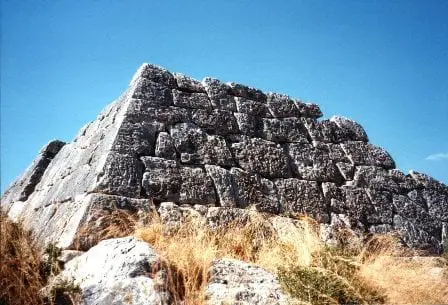“He that believeth on me, as the scripture hath said, out of his belly shall flow rivers of living water.” John 7:38
When one hears the term “pyramid builders,” one usually thinks of the Egyptians, Incas or the Aztecs, whose famous pyramids were built for religious purposes. You may not know that the Greeks also built pyramids. But as we might expect of the Greeks, their pyramids served a practical, everyday purpose.
 Thirteen Greek pyramids have been identified; all are about 2,500 years old. The forty-foot-high pyramids are located in the hills around the cities of Theodosia and the Crimea. They are constructed of loose limestone rock, through which the arid wind of the region could blow. As the cooling evening wind blew through the loose arrangement of rock, moisture in the air would condense on the rocks. The condensation would flow to the base of the pyramid where it was collected and piped to the city for use. A study of the clay pipes running from the pyramids led one archaeologist to calculate that each pyramid could produce a surprising 14,000 gallons of water per day!
Thirteen Greek pyramids have been identified; all are about 2,500 years old. The forty-foot-high pyramids are located in the hills around the cities of Theodosia and the Crimea. They are constructed of loose limestone rock, through which the arid wind of the region could blow. As the cooling evening wind blew through the loose arrangement of rock, moisture in the air would condense on the rocks. The condensation would flow to the base of the pyramid where it was collected and piped to the city for use. A study of the clay pipes running from the pyramids led one archaeologist to calculate that each pyramid could produce a surprising 14,000 gallons of water per day!
These ingenious and practical pyramids reflect the truth that man has always been intelligent. Perhaps you didn’t even know that water could be condensed from the atmosphere in usable amounts in this way. But the pyramids meant temporary survival in the dry climate. Permanent survival comes only from the living water that Christ gives through the forgiveness of sins. His water gives eternal life.





